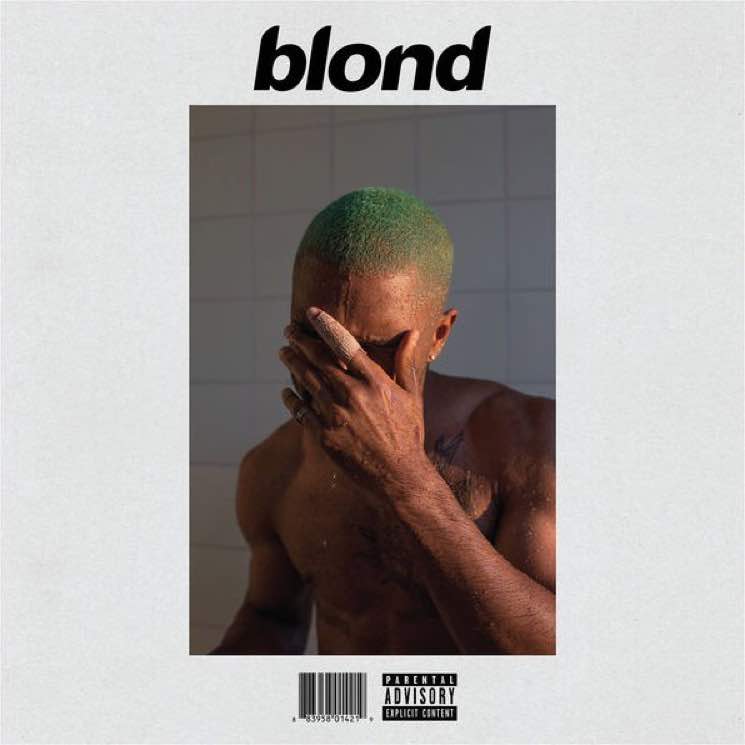"Highly anticipated" is an inadequate descriptor for Blonde, an album for which fans waited seemingly interminably.
Tonnes of web pages have been — and will be — filled with takes on whether 2012's Channel Orange earned the hype heaped on it upon its release. For a musician with such a young career, Frank Ocean has been defined by successes and failures in intersectionality surrounding race, class, sexuality and genre, and his self-marketing can be best defined as either haphazardly ad hoc or modern genius.
The long gestation of the formerly titled Boys Don't Cry — complete with promises of release dates that never delivered — suddenly turned into a volley of commercial output. Last week's drop of Endless, was a quick jab in the form of a "visual album" that set us up for Blonde — or Blond, as the cover art suggests — to hit us with the haymaker.
The perfect translation of the sounds from one's head into a faithful recording has been the source of pain for many an artist; this affliction no doubt hit Ocean hard. One sees words like visionary thrown about carelessly these days, but the label fits Frank. The album cover aptly describes Ocean's personal and professional angst: a black man shielding his face, presumably in shame after dying his hair blonde, because it came out green instead.
"R.I.P. Trayvon, that n*gga look just like me," goes the lyric on the charged "Nikes," a track (and video) that best represents Ocean at this stage in life, as he explores race, sexuality, gender and nihilism.
Blonde is a fevered mix: real-life guest stars — Beyoncé, Kendrick Lamar — make their presence known while inspirations — the Beatles, David Bowie, Elliott Smith — loom large. They all still graciously stand at the periphery, though, as Frank weaves his narrative throughout. Tracks like "Seigfried" and "White Ferrari" wear these inspirations on their sleeves; "Nights" jams, holding itself together just enough to aspire to be a single, as does "Pink + White"; "Pretty Sweet" is alternately punk and chamber pop; "Godspeed" is a hymnal cocktail of tranquility and repose.
Blonde is chaotic. Vibrant, it colours outside the lines. Poignant, it's transparent with altering modes of bravado, vulnerability and desperation. It is, thoroughly, a Frank Ocean album, yearning for perfection, sating the audience's hunger for dynamism, yet with the persistent feeling that the artist feels it's all a failure. Its flaws — excessive, indulgent, arriving early/leaving late — are also its strengths. A warts and all approach wards off denigration; how do you critique confessed imperfection?
Ultimately, it's an off-kilter dimensionality that draws us to Ocean. The alpha millennial, never beholden to mainstream labels of what gender, race and sexuality meant in the past: "We gon' see the future first," a glitter-covered Ocean prophesizes in the video for "Nikes."
Blonde is the album we were expecting. Blonde is the album we weren't expecting. Is Blonde the album we need? Does Frank Ocean care? Blonde is here.
(Independent)Tonnes of web pages have been — and will be — filled with takes on whether 2012's Channel Orange earned the hype heaped on it upon its release. For a musician with such a young career, Frank Ocean has been defined by successes and failures in intersectionality surrounding race, class, sexuality and genre, and his self-marketing can be best defined as either haphazardly ad hoc or modern genius.
The long gestation of the formerly titled Boys Don't Cry — complete with promises of release dates that never delivered — suddenly turned into a volley of commercial output. Last week's drop of Endless, was a quick jab in the form of a "visual album" that set us up for Blonde — or Blond, as the cover art suggests — to hit us with the haymaker.
The perfect translation of the sounds from one's head into a faithful recording has been the source of pain for many an artist; this affliction no doubt hit Ocean hard. One sees words like visionary thrown about carelessly these days, but the label fits Frank. The album cover aptly describes Ocean's personal and professional angst: a black man shielding his face, presumably in shame after dying his hair blonde, because it came out green instead.
"R.I.P. Trayvon, that n*gga look just like me," goes the lyric on the charged "Nikes," a track (and video) that best represents Ocean at this stage in life, as he explores race, sexuality, gender and nihilism.
Blonde is a fevered mix: real-life guest stars — Beyoncé, Kendrick Lamar — make their presence known while inspirations — the Beatles, David Bowie, Elliott Smith — loom large. They all still graciously stand at the periphery, though, as Frank weaves his narrative throughout. Tracks like "Seigfried" and "White Ferrari" wear these inspirations on their sleeves; "Nights" jams, holding itself together just enough to aspire to be a single, as does "Pink + White"; "Pretty Sweet" is alternately punk and chamber pop; "Godspeed" is a hymnal cocktail of tranquility and repose.
Blonde is chaotic. Vibrant, it colours outside the lines. Poignant, it's transparent with altering modes of bravado, vulnerability and desperation. It is, thoroughly, a Frank Ocean album, yearning for perfection, sating the audience's hunger for dynamism, yet with the persistent feeling that the artist feels it's all a failure. Its flaws — excessive, indulgent, arriving early/leaving late — are also its strengths. A warts and all approach wards off denigration; how do you critique confessed imperfection?
Ultimately, it's an off-kilter dimensionality that draws us to Ocean. The alpha millennial, never beholden to mainstream labels of what gender, race and sexuality meant in the past: "We gon' see the future first," a glitter-covered Ocean prophesizes in the video for "Nikes."
Blonde is the album we were expecting. Blonde is the album we weren't expecting. Is Blonde the album we need? Does Frank Ocean care? Blonde is here.
